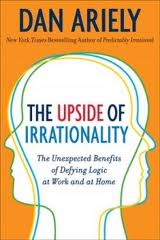 I recently enjoyed listening to the audio version of Dan Ariely's The Upside of Irrationality. He's also the author of Predictably Irrational, which I hope to read soon. The author, a behavioral economist and psychologist, begins by introducing an irrational behavior that affects all of us: procrastination. He says that procrastination is universal. When he sought a special treatment for a rare condition he had, he needed to inject himself with very uncomfortable medications on a weekly basis. In order to get himself to not procrastinate, he motivated himself with watching movies on his injection days, thereby associating good with bad. As humans, we prefer short-term, not long-term goals. We routinely fail to take short-term pains for long-term goals. He explains that there is a lot of human-incompatible technology out there that doesn't take into account our fallibility (like the stock market). While his first book (Predictably Irrational) is about the downsides of irrationality, this book is about its upsides. The first part of the book is about defying logic at work. Throughout the text, the author explained in detail the scientific studies used to come up with the conclusions presented. It was neat to understand how the experiments were designed.
The book was informative and entertaining from the experiment-design standpoint, and as someone who likes learning about psychology, I enjoyed the book very much.
0 Comments
Your comment will be posted after it is approved.
Leave a Reply. |
Archives
June 2024
Categories
All
Subscribe |
 RSS Feed
RSS Feed
